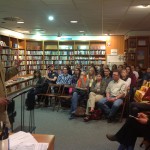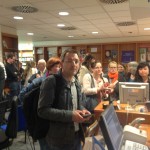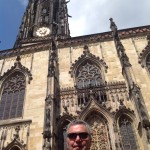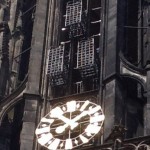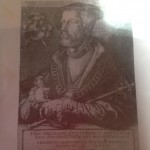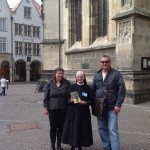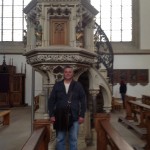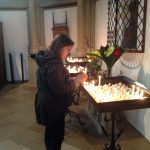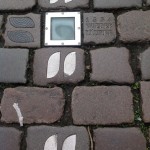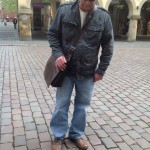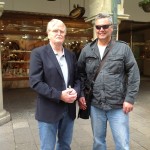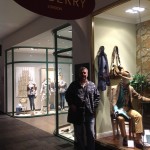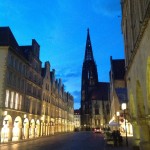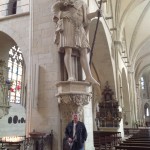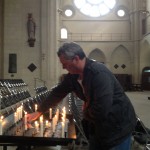We are the sons of our father, and we shall follow the print of his foot forever.
—Thomas Wolfe
______________
“It really is that simple,” they had assured me. Over and over again. “All you’re doing is getting on and getting off. It’s all set up. Someone will show up at the other end.” And looking back, it seems like such a little thing. I don’t know why it loomed so large inside me. But it did. Not fear, really, but a tension. It pulsed inside me, probably visible on my face, as I stepped onto that train to Mainz. With no one to guide me, for the first time since getting here. And the realization settled in. This is how it feels to be a stranger and alone.
The doors swished shut behind me. Lugging my bags, I stepped in and looked around. No one paid any attention to me. I’m just another passenger. Now, where was that seat Maryann had reserved for me? I glanced at the numbers. And realized my seat was clear at the other end of the coach. Oh, well. Nothing to do but drag my bags all the way down the narrow aisle. “Entschuldigen,” I muttered as I struggled through. And finally I reached my seat, the very last window on the left. An elderly lady sat on the aisle seat. She had parked her bags on mine. I’d have to bug her. I’m sorry, I said in English, pointing to my seat. That’s my seat. I parked my luggage off to the side, by the door as she got up and cleared my seat. Amazingly, she smiled at me. I slid in and sat down, clutching my messenger bag. That stayed right with me at all times. The nice lady took her place beside me. Whew. I was on. I was in my seat. On the train. I looked out the window as we slid from the station. Muenster. Only yesterday, I got here. Only yesterday. It seemed so long ago. Now it was today. Now I was leaving.
I can’t remember who broke the silence first, but somehow the nice lady and I started talking. In broken German, I told her. Leuphana University had brought me over to talk about my book. I pulled the copy from my bag and showed her. Ich bin von die Wiedertaufer. I am from the Anabaptists. I came to Muenster to see the cages. Now I’m going to Mainz, to speak at another University. She smiled, genuinely interested. In broken English and rough German, we chatted right along, the two of us. She had a house up north of Muenster and one in another city further south. She spent time in both places. And that’s where she was going now. To her southern house.
And there, on that first train ride by myself, a complete stranger I never saw before, this elderly German lady, settled me down and soothed my spirit. I’m not sure how. But she did. Maybe it’s because I realized there, in that moment, that people are people the world over. It didn’t matter that I was alone in a strange land. There would always be people like her along the way. We chatted, off and on, for the next couple of hours. The train slowed for the next stop, and she got up to leave. “You know,” she said, “we’ll likely never meet again. But maybe we will, one day.” I glanced at her sharply. She was smiling a secret little smile, the smile of one believer to another. Yes, I said. Yes, we will meet again one day. “By the way, my name’s Dorothy,” she said. We had never even spoken our names. Thank you, I said. You have blessed me. You really have. Her wrinkled face lit up. She beamed. Then she turned and was gone.
I sat alone through the remaining hour to my destination. Thought about things. Jumbled thoughts. Leuphana. Muenster. And now Mainz, coming right up. You can’t process things when they’re coming at you this fast, I thought. It’s a big deal, every day, day after day. And tonight I have a talk. I hadn’t even thought about that at all, hardly. No need to, I figured. I had addressed a packed-out crowd, back at Leuphana. It had gone OK. And tonight, when the time came, the words would be there to speak. Of that I had no doubt.
And I wondered, too, how it would go, how she would be, my contact there at Johannes Gutenberg. Professor Dr. Birgit Daewes (pronounced Davis). We had emailed back and forth a few times. She’d read the book, and was quite complimentary. But she was a real Professor. And a Doctor. Top of the line, academically, in Germany. Is she even in the real world? I had asked Sabrina and the others. Or is she out there in the ether somewhere? “Oh, no,” they had all assured me. “Professor Daewes is real and she’s genuine. She’s not stuffy at all. You’ll like her. You’ll get along great.” OK, if you say so, I said. Her emails had been pleasant enough, and she had insisted I call her Birgit, not Professor Daewes. But that’s probably pretty common, when you’re corresponding with a visiting author, I thought. Who can really tell what a person is like from that? I’ll know when I meet her.
The train swooshed along, and soon enough it slowed for Mainz. My stop. I waited at the door with a small crowd of passengers, watching. When the train stopped, one of them pushed a button on the wall to open the door. So that’s how you do it. I got off, trundling my bags behind me. Downstairs with the crowd, into the main station. Looked for the entrance. I walked out and scanned the buildings across the street. And there it was. The Koenig Hotel. I walked over the broad expanse of bricks in front of the station and crossed the street. Approached the hotel. Pushed my way in. The clerk, a young man in a suit, turned to me. Ira Wagler, I said. There should be a reservation. “Yes,” he said. He handed me a key and directed me to my room on the third floor. And just as I turned away, I thought of it. Turned back. A Laundromat, I said. Is there a place close by where I can get some clothes cleaned?
Somewhere, at some point along the road, I needed to do one load of wash. Mostly T-shirts, underwear, and socks. And I had time right now. Birgit was coming over to fetch me a little later, around six or so. I had an hour. And here, at the counter, the nice clerk smiled. Spoke in perfect English. “Oh, yes, right over across the street, beside the station on the left.” He scribbled my room number on the back of a hotel card and handed it to me. “Just give them this, and they’ll deliver your laundry right to your room.” Thanks, I said. Great, I thought. How cool is that, to get your wash delivered right to your room? I’ve never had such a thing done before.
I took my bags up to the room and unpacked. Half a room, is what I had here. A tiny place, with a half bed and a bathroom. Very nice, and very clean. I had smashed all my laundry in a little white garbage bag packed just for that purpose. After settling in a bit, I headed out, clutching my white trash bag. Full of clothes that needed washing.
I walked from the hotel and scanned the little shops beside the station. And there it was. The Laundromat. Off to the left, there. Just like the clerk had claimed. Dodging through the crowd, I walked up and walked in. The proprietor approached. He looked Italian. I plunked the garbage bag on the counter. Opened it. The hotel people said you do laundry, I said, showing him the clerk’s card. “Yes,” he said in broken English, all smiles. “Of course. We will bring it to your room.”
And I showed him what I had. T-shirts. Underwear. Socks. He pulled out the T-shirts first, and smiled. Of course. We will clean them. But he quit smiling when he saw what all else there was. “No, this will take three days. I send it off.” Ah, come on, I said. Don’t you have a washing machine around here somewhere in the back? Something that washes with water? I don’t need my T-shirts dry cleaned. I need a Laundromat. He was apologetic, I’ll give him that. He probably never saw anyone like me before, not referred from the Koenig Hotel. But he dealt with it, right as it came at him. He couldn’t do it, he told me. Well, he could, but it would take three days. So I thanked him, picked up my white garbage bag, and trudged back to my room, dejected. All I needed was one washing machine, I thought. To do one load of wash. I’ll have to find a real Laundromat somewhere, soon, along the way.
Back in my room, I freshened up a bit. Unpacked my jacket. Changed to khaki pants. Book talk tonight. Can’t be showing up in jeans. I stretched out on the bed then, to just unwind for a few minutes. A short time later, the phone jangled. Yes? “Ira?” A very pleasant voice. “This is Birgit. I’m here at the front desk.” I’ll be right down. A few minutes later, I stepped out of the elevator and there she stood, smiling. I was startled by how young she was. She walked up and greeted me. “We’re so excited to have you. Thanks for coming.” And she handed me little bag with a gift. A bottle of organic wine. I thanked her. My, what is it with these Germans and their gifts? In the culture I come from, there’s not a whole lot of emphasis on gifts. I took the wine up to my room, returned, and we walked across town to the off-campus bookstore where I would speak later.
We chatted right along as we walked, and I was instantly comfortable. Sabrina and her friends had been right. Professor Daewes was who they claimed she would be. We arrived at the bookstore and walked in. Birgit introduced me. “They have forty people or so signed up,” she told me. “And now the phones are ringing. We don’t know exactly how many will show up.” That’s great, I said. And then we walked around the corner, to a little café to grab a bite to eat before the talk. Birgit was bubbling with a bit of news of her own. She had just been offered a position at another University. And she had accepted. In February, she will be Chair of American Studies at the University of Vienna. In Austria. Wow, I said. Just flat out wild, is what that is. That’s pretty much the pinnacle of your profession. The University of Vienna. And Department Chair, yet. Congratulations.
And events just moved right along. After eating, we strolled back to the bookstore, where things were breaking loose. A large crowd had gathered. Way more than forty people. They were dragging out chairs and benches from wherever they could be found and setting them up. A hundred people, Birgit told me. A hundred people were here. Far more than they had expected. I drifted about, scoped out the little podium up front. That’s where I would speak. From the crowd, a man approached me. “I’m Michael Werner,” he said, shaking my hand. Ah, yes. My friend John Schmid’s friend. John had told me to contact Michael earlier, and I had. We messaged back and forth. I told him I was speaking in Mainz, and sent him a link to the book talk poster. And somehow, I mentioned that I had some free time the next day, Saturday. And he wrote that he would have time to show me around a bit. Thanks for coming, I told him. We’ll talk later, after it’s over.
And then it was time. I can honestly say I wasn’t all that nervous. It rushed up too fast to get nervous. Birgit stepped up to the podium to introduce me. A few words about the Amish, first, then: “This is Ira Wagler, who came from the Amish. He wrote this book, Growing Up Amish. And from his blog, I got this. He has led the Lob Song in Amish church a dozen times. And his favorite TV show is The Simpsons. So we can see he has a very broad spectrum of interests and experiences. Let’s welcome him.” And all the people politely clapped their hands.
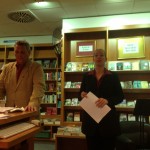
Introduction by Professor Dr. Birgit Daewes.
I’m hastily reviewing my notes.
And I got up behind the little podium and stood there. And spoke, a version of the talk I gave back at Leuphana. There was no mike, so I had to speak up. I hope those sitting in the back heard me. After half an hour or so, I read two scenes from the book. Then I opened for questions. And they came, right along. And again, at some point, I slipped it in. The Amish could not live here, in this country. You are not free enough. You all need to do something about that. And the questions kept on coming until Birgit said, “One more.” And then it was over, and all the people clapped again. I’ll be happy to chat and sign your copies, I said. They have some for sale up front. Turns out they had 26 copies. And those sold out in minutes. I stood in the back at a little table and smiled and greeted people and signed their books. The oddest thing that happened was when two young guys, students, walked up to thank me. They didn’t have a copy of my book. And they hadn’t read it. They just wanted to tell me. They had attended the talk (maybe it was a class requirement, I don’t know), fully expecting to be bored. They weren’t, they said. And I posed for pics with one of them, as he held up a borrowed copy of my book.
So much went on in those few minutes that it’s hard to sort and tell. A stocky middle-aged man approached. The pastor of a local Mennonite church. He had come, along with several others in his congregation. Somehow, they had heard that I’d be here. We chatted for a few minutes. There were so many things I would have liked to ask him. But there just wasn’t time. I thanked him for coming. Another couple approached with a book. What name shall I address it to? I asked mechanically. They stood there, silent, smiling. And then I recognized them. I had not seen them in twenty years, when we all graduated from Bob Jones University together. Mike and Janan Kreger. They lived in Germany. Janan was my Facebook friend. I had sent her a link about the talk. And they had actually driven over an hour to be here. I hugged them both. I’m honored. It’s so good to see you again. They stepped back, then, while I signed more books and chatted with anyone who wanted to talk.
We wrapped it up soon after that. Birgit seemed very happy with the turnout. As were the people who worked in the bookstore. The place had been packed out. And I did what I had done at Leuphana. Asked for a one of the posters they had hanging on the door. I took it and signed and dated it. They gave me a little tube to store it in. I’m taking these home, these posters, I said. This one, and the one I got from Leuphana. Signed and dated, both of them, on the days the talks happened. And I’m getting them framed.
And then we walked back toward the hotel, a group of us. Birgit and a couple of her assistants. Mike and Janan. And Michael Werner, the guy who was going to show me around the area the next day. We settled at a few tables, at an outdoor café within sight of my hotel. We all ordered drinks. Mike and Janan ordered food, as they had not eaten, yet. And there we sat, in a group, talking like old friends. In the ancient city of Mainz. Outdoors, at night, under the lights. Across the way, the trains slid in and out. People got on and off and on and off. The crowds flowed and swirled around us.
Mike and Janan asked about my trip, how it had been so far and where I was going next. I’m heading to Switzerland soon. Probably tomorrow or maybe Sunday. Michael Werner, my friend here, is taking me around tomorrow, to see the area. And they just locked in. “Hey, come and stay with us tomorrow night. Maybe Michael can drop you off at our house. We’ll get you on a train to Zurich on Sunday.” Michael agreed instantly. Yeah, he would do that. They exchanged phone numbers. I sat there, amazed. And then it came to me. I asked Janan. Do you have a washer and dryer I can use? I need to wash some clothes. “Of course we do,” she said. And it all came together, just like that. I sat there, amazed again. Maybe I wasn’t as much of a stranger around here as I’d thought.
Around eleven or so, people were making noises to leave. My hotel was right next door, so I didn’t have far to go. Birgit thanked me one more time. “Thanks so much for coming. It was just a great turnout, all around. Safe travels. We’ll have to bring you back again,” she said. I’d like that a lot, I said. It was my honor, all the way. I’d love to come back sometime. But I won’t look for anything like that until I see it coming. Michael Werner left, then, after we had agreed to meet outside the hotel at nine the next morning. And Mike and Janan took off, too. They had more than an hour’s drive to their home. See you tomorrow night, I said. And thanks so much for inviting me over. I walked back to the hotel and to my room. And tried to relax, to unwind and absorb. What a day. What a fantastic day.
You never sleep that well, traveling that long and that far. At least I don’t. And for sure not on this trip. The days were too intense to allow me to fully relax at night. Because you’re always thinking of what you just saw, all while trying not to think of what was coming tomorrow. It’s like a little vortex, a little twilight zone, a dimension you’re not quite sure is real. And I didn’t sleep that well that night in Mainz. Just dozed fitfully.
The next morning, I got up and walked into a new day. A few minutes before nine, I dragged my bags out of the Koenig Hotel. And there he stood, by his little van. Michael Werner. He waved at me. I walked up and we loaded my luggage in the back. We got in. And he took off. Out of the city and out into the country.
He is actually Dr. Michael Werner, a successful business executive with a PhD in Linguistics. And he writes and publishes Hiwwe wie Driwwe, a biannual newsletter, in Amish Pennsylvania Dutch. He knows the culture. And every couple of years or so, he travels to Amish lands. Mostly in Pennsylvania. But Ohio, too. Let’s just say the man is very knowledgeable about the Amish. He knew my book was out there, at least I think so. But he hadn’t read it. He had bought his copy the night before, at the bookstore where I had my talk. He was one of the lucky 26, I guess. We just chatted right along, from the moment I boarded his van. There’s nothing like having someone local show you around in a place like this, I told him.
And we shot out along the highways. I don’t know if we were ever on what is officially known as the Autobahn, but we sure drove some roads that had no speed limits. And now and then, Michael swung into a clear left lane and ratcheted up to speeds you’d never drive back home. Mostly, though, we just drifted along with the traffic. And often, as we did that, cars shot by us on the left as if we were just sitting there.
And we just talked. About who we were, where we came from. And he told me what he had mapped out for the day. First, off to a village to see family, his wife’s uncle, aunt, and their two sons. They owned a butcher shop. He turned off the main roads onto back roads, clogged with farmers driving tractors. We putzed along, on and on, to a village way back in the hills. And he pulled into a little parking space by a shop. We got out and walked in. A tiny glass meat counter, stocked with various cuts of this and that. Sausage links dangled from the walls. A buzzer in the back rang. And a lady emerged from the door separating the living quarters from the shop.
She greeted Michael as family. They chattered back and forth. He introduced me. And she invited us into her home. We squeezed past the counter and entered the kitchen. Sat at the table. Coffee? Of course. And she brought us food, an assortment of those amazing German bread rolls and a little slab of meat. We sat there and munched. Well, I munched, as Michael talked. Asked the questions I would have asked. About the history of this place. How old was this shop? How was the place set up, way back? Where did the family butcher the cows and hogs, way back when they actually butchered on this place?
The shop has been open continuously for 130 years, run by the same family, in this village. Right at this spot. I drank it in, absorbed it, as Michael told me. This would be the last generation. There were no offspring, in this family. The sons never got married. And never had children. Within ten years, he figured, the place would be closed down. After more than 130 years, it would be closed down. It was tough for me to grasp the history of the place, and to know at the same time that a story that had lasted so long was ending very soon. I mean, how do you grasp opposite details like that, all in the same instant? You can’t.
On our way out, I bought a couple of small links of sausage to take with me to the Kregers that evening. One Euro each. We took our leave, then. Headed out to the next stop. “A museum,” Michael told me. Great, I said. This would be the second museum on this trip. I can’t remember the last time I was in one, back home. But here, in Germany, you bet I wanted to go see what was there when someone invited me to a museum. You bet I did.
We drove along little two-lane back roads. We were running a bit early, Michael said. So we pulled off into another little village, into the parking lot of an old church. Got out and strolled about outside, among the graves. And Michael told me a startling thing I never knew. In Germany, you rent burial plots, usually for thirty years. The grave sites are quite elaborate. Each family cares for its own, waters the flowers, keeps things trimmed up and looking nice. Then, after the rental time is up, the coffin is dug up. The corpse is exhumed and disposed of. (Who would want THAT job?) Disposed of? I asked. How? What do they do with it? Michael was fairly vague on that point. So I’m not sure what happens to the bodies. But it doesn’t matter, really, when you think about it.
Because what I got from that story is that there will be no permanent marker of your passing. When you’re gone, even the record of who you were will be eliminated in time. They throw it all away, it’s all destroyed, the tombstone, the coffin, the body, everything. All you ever were will be wiped from the face of the earth as if it never was. Which will happen to all of us eventually, anyway, I suppose. The Germans are just more upfront and efficient about it. But that 30-year burial span shocked me. I’m not knocking the practice. It is what it is, and it’s not my business to criticize how they do things in other countries (well, except when it comes to those ghastly windmills, then I can’t help myself). I’m just surprised that I never heard of it before.
On, then, to the museum. We pulled into the little village of Oberalben, in the Palatine. And there it was, tucked away right on the main street. The Palatine Emigration Museum. The place was closed, but Michael knew the lady who had the key, and she met us there at the front door. We walked in. And for the next hour, I got a private tour. The exhibits were all about the stories of people from this area who had left, way back. Most of them had sailed to America. It was hard, life back then. You could see that from the exhibits and the pictures on the walls. But the Germans had done well in the new lands. They will always do well, wherever they go.
And then it came at me, the most startling thing I saw on the whole trip. Startling, because it was so unexpected. On the one wall hung a big poster, a family scene from Amish country in Lancaster County. Those are the people I come from, I said. And I live in Lancaster County right now. I wonder where that picture was taken. The Germans are just fascinated by the Amish, seems like. Somehow, they feel connected to this little group of pilgrims that emigrated to America hundreds of years ago. Mostly, I suspect, because the Amish have retained a form of the German language. Pennsylvania Dutch.
After admiring the poster, I wandered into another room. Off to one side stood a glass display case. In that case, several publications, spread out. And there they were. Copies of the magazines my father co-founded, way back in the 1960s, the big three. Family Life. Young Companion. Blackboard Bulletin. I couldn’t believe what I was seeing. Look, I practically hollered. Look at these magazines. Mine Vater hat Diesen geschrieben. My Dad wrote these. These are the magazines he founded. How in the world did they get here? And I just stood there, in that remote little museum, and absorbed my father’s presence. There is no escaping who you are and where you come from, no matter where you go.
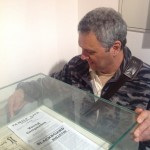
My father’s presence in the Museum.
Dad always wanted to go to Europe. To Germany, to Switzerland, and to Alsace-Lorraine in France, where the Waglers come from. He always wanted to get to the lands of his ancestors, somehow. He dreamed of it. Hopelessly, probably. He knew he’d never make it. And he was right. He never made it. But his voice did. He simply wrote from where he was in his Amish world. And his was a powerful singular voice that spoke to his world and to his people. And reached a lot of other places, too, distant lands he could never hope to see.
From where he was coming from, that’s quite an accomplishment, any way you look at it. And I am very proud to be one of my father’s sons.
We thanked the lady, then, and left. Off to our next destination. A good distance away. Back onto the main roads, into the streaming traffic. It was past lunch time, so we looked for a place to eat. A McDonald’s sign swept by. At the next exit, it said. Michael motioned at the sign, and asked me. “Do you want to eat at McDonald’s?” No, no, no, I said. Anywhere but there. I won’t eat American fast food, not here in Germany. So we raced on. Eventually we pulled off in a military town and ate at a classic American Diner close to the base.
And then it was on to the next stop. The little village of Weierhof. The Mennonite Research Center there, that’s where Michael wanted to take me. I thanked him again. The man took off for a whole day, a Saturday when I’m sure he had a thousand other things he could have been doing, just to show me around. Where does such hospitality come from? There’s no way I can ever repay you, I said. You have a lot of contacts in Lancaster already. But when you come again, let me know, and I’ll give you whatever time you need. I can’t imagine that I’ll be able to show you anything even close to what you’re showing me here.
We drove to the home of Dr. Horst Gerlach, the man who devoted much of his life to the little Research Center. An older guy, in his eighties, I’d say. Still quite alert and quite active. We visited, and he pressed a large hardcover book into my hands. A gift. He had written it. I thanked him, and handed him a signed copy of my own book for the Research Center. We all want our voices to remain after we are gone. That’s just how it is. It’s kind of a hopeless thing, really, because very few written voices long survive their authors in the open market. Actually, most die long before their authors do.
After chatting a bit, we set off for the Center. A little place in the village. Dr. Gerlach told me of the last Amish people in Europe. The last few remaining members switched over to the Mennonites way back in the 1930s, I think it was. “The Amish in Europe weren’t distinct, like they are in America,” Dr. Gerlach said. “They had all the modern farming equipment of their times.” He told us tales of people in the village around us. Names, houses, dates. When Napoleon came through, he pressed some of their young men into his army. He showed us through the Research Center. And I paged through a copy of the Martyr’s Mirror, published in 1782.
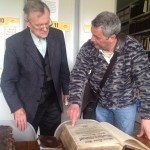
With Dr. Gerlach and the Martyr’s Mirror at the Research Center.
And then it was time to go to the home of my hosts for the night. My friends, Mike and Janan. They lived in a village not far from Heidelberg. By six o’clock, Michael pulled up outside their door. We unloaded my bags. Mike met us and welcomed me in. I shook Michael’s hand and thanked him again. What you gave me today was priceless. I can’t tell you how much I appreciate it. Thank you. Look me up next time you come to Lancaster County. “I will,” he said. And then he left us.
Mike and Janan and their three children and their large dog welcomed me into the clamor of their home. It was a comfortable and welcoming place. “We are so happy to have you. We don’t get many visitors from back home,” Janan said. And I looked to the first order of business. Unpacked my garbage bag of laundry. Mike took me downstairs to the washer, and we threw in my clothes and started the load. Pretty amazing and pretty simple, how that all worked out. Later, we went out to eat in a local restaurant. Then returned home and sat around and caught up. Rehashed our old BJU days. Tomorrow, they said, they would skip church. Instead, we’d head out for the old town of Heidelberg, tour that a bit, then they’d put me on a train to Zurich.
And that’s what happened. I woke up to a huge, scrumptious breakfast. Then before we left, they went online and helped me locate and reserve a room for that night at a nice hotel outside of Zurich, for about a third of the price of a room inside the city. Zurich, I would discover, is an evil little place. And it would leave its mark on me.
And then we headed to Heidelberg. What can I say about that city? It’s so old, and so full of stories. Mike told me of how the French attacked the town and pretty much leveled it, way back. No wonder there is such deep and heavy animosity between the French and the Germans, I thought. This is like a Kentucky blood feud that never stops. It’ll always bubble up again. We walked up the steep hill to the grounds surrounding Heidelberg Castle. The French blew much of the place to smithereens. And the ruins still remain, just as they were back then. It’s simply overwhelming, to try to take it all in.
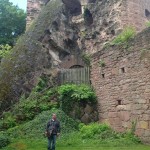
Ruins of the massive tower at Heidelberg Castle.
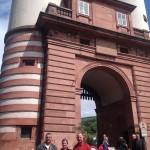
With Mike and Janan Kreger at the Heidelberg Bridge.
Then it was off to the train station, right at three o’clock. The parking lot was packed out, so Mike circled around with the van and children as Janan walked in with me and helped me purchase a ticket to Zurich. Then she walked downstairs with me to the tracks. Chatting right along about how to ride the train, what to look for, how to make connections. We stood there, waiting, until it pulled in. We hugged, I thanked her, and then it was onto the train and off to Zurich. And this time, I was nervous, sure. But somehow the tension I had felt in Muenster, that wasn’t pulsing so strong within me. Whatever happened, I’d make it through.
Germany was done. Behind me, all the magic and wonder and mystery of it. Before me, the ancient lands of Switzerland beckoned. And inside me, way down deep, the old, old ancestral memories stirred.
******************************************************
Well, last weekend I got it done. Went up to Aylmer to see Dad and Mom. It was a remarkable experience, and I’m still processing it. One of these days, after I get done telling about my European trip, I’ll get it written, how it was to see my father and talk to him about the book.
And looking back at all that Switzerland was to me, I have a couple of options. Or maybe three. Break my recent promise, and just crank it all out in one long, long post. Or break it up in two. Or just condense it. I don’t know which way it will come. But I’m about ready to get it all relived and told, so I can wander off to other fields.
Share


